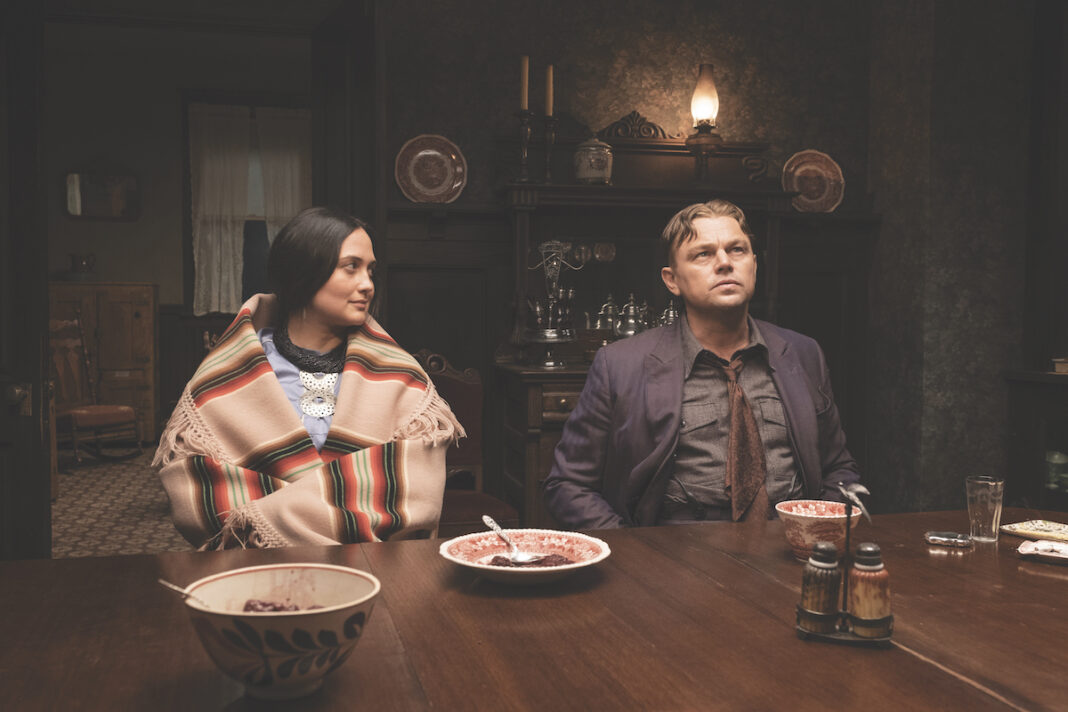Killers of the Flower Moon is putatively Martin Scorsese’s first Western. As such, it’s a departure from the films that made him famous. There are no car bombs in a Las Vegas parking lot, nor New York mobsters co-opting a temperamental prize fighter. But if the director’s followers are ready to accept Scorsese’s renowned gangster films as an implied critique of the violent ways of doing business, American style, then a story about oil, greed, robber barons and Native Americans in 1920s Oklahoma should fit into Scorsese’s filmography quite nicely.
After all, how is a tale of white businessmen elbowing their way into a big payday they previously overlooked all that different than the grab-a-buck heroics of Goodfellas or Casino—not to mention the frat-boy corporate rapaciousness of The Wolf of Wall Street?
Someone is killing members of the Osage nation in Oklahoma and, by means of insurance, hard-to-prove connivance and official indifference, stealing the petro-rich land from the natives and their descendants. The Osage were given the land by the government with the idea that it was worthless. Subsequent events proved otherwise. Now Osage men, women and children are being stabbed, shot, dynamited or drowned in sludge pools for their inheritance.
A tragic story, but that’s of marginal interest, initially, to Ernest Burkhart (Leonardo DiCaprio), fresh out of World War I. Ernest arrives in the town of Fairfax, in the Osage reservation, at an opportune moment. His benevolent uncle, William “King” Hale (Robert De Niro), the area’s leading—read: white—wheeler-dealer, is the driving force behind the land grab.
With transparently patronizing camaraderie, King offers Ernest a job and convinces his eager but none-too-bright nephew to hook up with an Osage woman named Mollie (Lily Gladstone). The better to get behind the wheel of Mollie’s “full-blood estate” and therefore the “head rights” to her share of the oil fields. In an old-fashioned Hollywood Western a hustler like King would hold court at a saloon poker game, but here he spouts fake-gospel bromides while driving around in his car, checking on his ill-gotten holdings. Seemingly every felonious peckerwood in Osage County is in on it. And so is Ernest, up to a point.
It’s part of Scorsese’s and screenwriter Eric Roth’s grand, sweeping scenario—adapted from author David Grann’s true-crime book—that Ernest’s dilemma grows deeper and darker as the plot progresses. Notwithstanding the racist social parameters of the day, he truly loves the “inscrutable” native woman who gradually becomes completely devoted to him and their children, all the while recognizing, deep in her heart, that the odds are in favor of the white man. Copious amounts of blood and tears are spilled. Even by Scorsese standards, Killers is a very violent entertainment.
As if to compensate for the overly familiar framework, Scorsese decorates the sinister tale with some of the finest production values available. The needle-drop period music playlist is exquisite, as are the film editing and sound engineering. The Osage ceremonies ring with what we can only believe is absolute authenticity. And the performances of DiCaprio, Gladstone and DeNiro, in challenging roles, surpass those of practically every other film on the market in this dry year at the movies.
Gladstone’s saintly Mollie, wrapped in a blanket of anti-clichéd stoicism, is a wonder to behold. De Niro’s King, for his part, is content to sit patiently in his web, waiting for his prey. He’s a chilling echo of De Niro’s Jimmy the Gent Conway, in Goodfellas, trying to lure Karen (Lorraine Bracco) into his swag shop—poised and ready to snuff the mark. Meanwhile, for DiCaprio’s hopeless Ernest it’s a chump’s legacy.
Killers is perfectly satisfying as an earthy story of unhealthy love, but more than that it’s a wrenching account of this country’s late, unlamented Manifest Destiny at work. When an Osage elder complains, “Our blood is getting white,” a viewer can only sadly nod in consent. See it and believe it.
In theaters.








